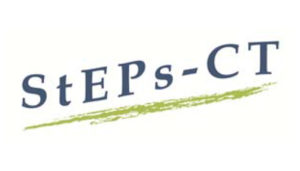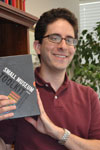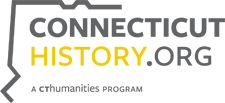"StEPs-CT encourages all of us who participate to strive for higher standards in our organizations' operations and to increase services to our audiences."
– StEPs-CT Program Participant

About the Program
Connecticut Humanities helps local museums, historical societies, and other cultural organizations build professionalism and ensure their programs and collections remain vibrant community resources through StEPs-CT–a program created with the Connecticut League of History Organizations, and run in partnership with the Connecticut Historical Society, that guides them towards excellence in six areas of organizational practice.
StEPs-CT is based on the “Standards and Excellence Program for History Organizations” (StEPs), a national model curriculum developed by the American Association for State and Local History (AASLH). We’ve added a series of hands-on workshops, expert mentors who are on call to help with the rough spots and a competitive granting fund to support projects related to the program. The StEPs-CT program is the first in the nation to implement the StEPs curriculum on a statewide level.
To be accepted into the program, StEPs-CT organizations need to make a compelling case for how they would benefit from participation and demonstrate commitment to completing the entire program. In return, CTH provides all resources at minimal cost.
Curriculum
StEPs-CT is an integrated program of professional development, facilitated conversation, mentorship, and competitive grant funding for smaller cultural organizations. StEPs-CT is based upon a curriculum of best practices and aligns with the national curriculum developed by the American Association for State and Local History (AASLH) called StEPs.
StEPs is an acronym for “Standards and Excellence Program for History Organizations.” Since its debut in 2009, StEPs has helped nearly 1,000 institutions nationwide, including 51 in Connecticut, begin taking “steps” to plan for positive change.
The six standards sections covered in the program are:
- Mission, Vision and Governance
- Audience
- Management
- Stewardship of Collections
- Stewardship of Historic Structures and Landscapes
- Interpretation
How to Apply
StEPs-CT is designed for smaller Connecticut museums, historical societies and other cultural organizations that are interested, willing and committed to strengthening their organizations.
Check out our list of StEPs-CT Frequently Asked Questions for more information about the program, benefits of participation, and program requirements.
FAQsInstructors
Instructors introduce each StEPs-CT curriculum unit, discuss the section’s standards and components, lead participants through all workshop sessions, and close out each unit with a half-day feedback session.

Scott Wands
Scott Wands serves as Manager of Grants & Programs at Connecticut Humanities. He manages CTH’s non-grant-funded services to Connecticut’s cultural community and oversees CTH’s granting programs. He is co-creator and manager of StEPs-CT. A graduate of the Winterthur Program in Early American Culture from the University of Delaware, Scott currently serves as a Council Member for the American Association for State and Local History (2016-present) as well as a board member on the national Field Service Alliance. He is also a former board member of the Connecticut League of History Organizations and has served on numerous American Association for State and Local History committees, including serving as the Region 2 Chair for Awards for CT, RI, NY, and NJ from 2008-11 and 2016-17.
Mentors
Program mentors coach five organizations through the StEPs-CT program, providing both in-person and remote consultation time for each curriculum unit.

Kathleen Craughwell-Varda
Kathleen Craughwell-Varda is a museum curator/consultant with more than twenty-five years experience in the field. She has worked with numerous institutions in Connecticut, New York and New Jersey conducting collection surveys, exhibition research, and creating interpretive materials. She was the Assistant Director and Field Services Director of the Textile Conservation Workshop in South Salem, New York. She has been the Project Director for Conservation ConneCTion, Connecticut’s response to the IMLS “Connecting to Collections” initiative since the program was launched in 2008. She is also a founding member of COSTEP-CT (Connecticut Coordinated Statewide Emergency Preparedness) and has been an assessor for Heritage Preservation’s Collection Assessment Program (CAP) since 1994.

Elizabeth Fox
Elizabeth Fox has assisted institutions with exhibition planning and implementation, institutional assessments and planning and collection assessment. Prior to forming her consulting company in 1997, she worked at the Yale University Art Gallery, Connecticut Landmarks, Wadsworth Atheneum and the Connecticut Historical Society. She serves on the board of the Connecticut League of History Organizations, is an advisor for the Peer Advisor Network at the Connecticut Office of Culture and Tourism and chairs the Cheshire Historic District Commission.

Sarah Griswold
Sarah Griswold has worked in the field of historical societies and small museums since 1991. She was the curator at the Gunn Memorial Museum in Washington, CT, and executive director at the Glebe House Museum & Gertrude Jekyll Garden in Woodbury, CT. She is currently an independent museum consultant, assisting libraries and museums in collections care, exhibit development and strategic planning, as well as research projects and programs. She works as an advisor for the Peer Advisor Network at the Connecticut Office of Culture and Tourism and serves as a Museum Assessment Program peer reviewer. Sarah is also a former member of the board of the Connecticut League of History Organizations.

Jacquetta Haley
Jacquetta Haley completed her doctorate in American History and decided that her future lay in history museums rather than academia. She worked on the five historic properties owned by Historic Hudson Valley for twelve years before becoming an independent consultant. Her work as a consultant has covered basic research, furnishings plans for a diverse group of houses throughout the tri-state area, the development of interpretive strategies for homes with multiple story lines, and exhibitions. As a board member and president of the board of the Greater Hudson Heritage Network she has been instrumental in refocusing the organization’s strategic priorities, including serving as the Chair of the Strategic Planning Committee.

Melissa Josefiak
Melissa Josefiak works as an independent museum professional as she raises her young daughter full time. She contributes to collections blogs, provides exhibition support and serves as the exhibitions review editor for “Connecticut History,” the scholarly journal produced by the Association for the Study of Connecticut History. She served as the assistant director of Wethersfield Historical Society for several years and served on the board of the Connecticut League of History Organizations, co-chairing its “Professional Basics” series for five years.
Participating Organizations
Twenty-three organizations completed our second StEPs-CT class from January 2015 through February 2017:
Avery-Copp House (Groton), Cheshire Historical Society, Colchester Historical Society, Connecticut Valley Tobacco Historical Society (Windsor), Cornwall Historical Society, Danbury Railway Museum, Deep River Historical Society, Denison Society (Mystic), Dudley Foundation (Guilford), Essex Historical Society, Groton Public Library, Guilford Keeping Society, Naugatuck Historical Society, New Britain Industrial Museum, Newtown Historical Society, Salisbury Association, Smith-Harris House (Niantic), Stonington Historical Society, Wallingford Historic Preservation Trust, Weston Historical Society, Westport Historical Society, Wilton Historical Society, Wood Memorial Library (South Windsor)
Twenty-four organizations completed the inaugural StEPs-CT class from 2012-2014:
American Clock & Watch Museum, Avery Memorial Association, Blue Slope Country Museum, Institute for American Indian Studies, Society of the Founders of Norwich, Windham Textile & History Museum, and the historical societies of Canton, Chester, Farmington, Haddam, Harwinton, Kent, Lebanon, Madison, Norwalk, Old Saybrook, Old Woodbury, Shelton, Sherman, Southbury, Torrington, Totoket, Warren and Wintonbury.
![]()
2017 Grants Awarded
StEPs-CT Grants allow organizations to pursue projects that will help them implement the skills and lessons learned during their StEPs-CT training. In 2017, Connecticut Humanities awarded StEPs-CT grants to the following 25 organizations with support from the State Historic Preservation Office of the Department of Economic and Community Development with funds from the Community Investment Act of the State of Connecticut:
Avery Memorial Association (Groton)
$4,999 for Interpretive Plan Project for the Ebenezer Avery House
Avery-Copp Museum (Groton)
$4,999 for Storm Windows: Preservation and Protection
Blue Slope Country Museum (Franklin)
$3,882 for Developing an Interpretive Plan
Brookside Farm Museum (Niantic)
$4,919 for Strategic Planning
Cheshire Historical Society
$1,019 for Developing and Implementing a Collections Management Policy
Colchester Historical Society
(Colchester) $4,985 for Colchester’s School for Colored Children Narrative
Connecticut Valley Tobacco Historical Society (Windsor)
$3,521 for Connecticut Valley Agricultural Museum Strategic Plan
Cornwall Historical Society
$3,210 for Strategic Plan Development for 2018-2023
Danbury Railway Museum
$4,554 for Strategic Planning—A Road Map for the Future
Deep River Historical Society
$4,999 for Taking Steps to Become a Small Museum
Denison Society (Mystic)
$4,995 for Installation of UV Insulating Interior Storm Windows
Dudley Foundation (Guilford)
$3,630 for Collections Assessment
Essex Historical Society
$4,342 for Street Signage & Lighting
Friends of Wood Memorial Library & Museum (South Windsor)
$4,949 for Interpretive Planning for Native American Village
Groton Public Library
$4,908 for Collection Assessment of the James L. Streeter Collection
Guilford Keeping Society
$2,794 for New Signs for the Guilford Keeping Society’s Museums
Haddam Historical Society
$1,522 for Strategic Plan 2017-2022
Kent Historical Society
$4,999 for Emergency and Disaster Planning
Naugatuck Historical Society
$1,775 for Collections Preservation and Management
Norwalk Historical Society
$4,990 for Pre-planning: Norwalk Before 1835 Exhibition
Salisbury Association
$2,400 for Strategic Planning
Stonington Historical Society
$4,500 for Redesign and Rebuild of stoningtonhistory.org
Weston Historical Society
$4,999 for Needs/Use/Interpretation Assessment of the Coley House
Westport Historical Society
$1,887 for Implementation of Strategic Plan 2017-2020
Wilton Historical Society
$4,999 for Wayfinding Signage at the Wilton Historical Society
![]()





